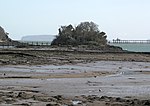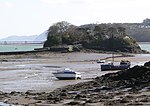Chateau Rhianfa
Country houses in AngleseyGrade II* listed buildings in AngleseyHotels in AngleseyRegistered historic parks and gardens in AngleseyUse British English from October 2023

Chateau Rhianfa is a Grade II*-listed hotel and former mansion in Anglesey, North Wales. Its gardens are also listed as Grade II* on the Cadw/ICOMOS Register of Parks and Gardens of Special Historic Interest in Wales.
Excerpt from the Wikipedia article Chateau Rhianfa (License: CC BY-SA 3.0, Authors, Images).Chateau Rhianfa
Beaumaris Road,
Geographical coordinates (GPS) Address Nearby Places Show on map
Geographical coordinates (GPS)
| Latitude | Longitude |
|---|---|
| N 53.2382 ° | E -4.1438 ° |
Address
Beaumaris Road
LL59 5PA , Cwm Cadnant
Wales, United Kingdom
Open on Google Maps






